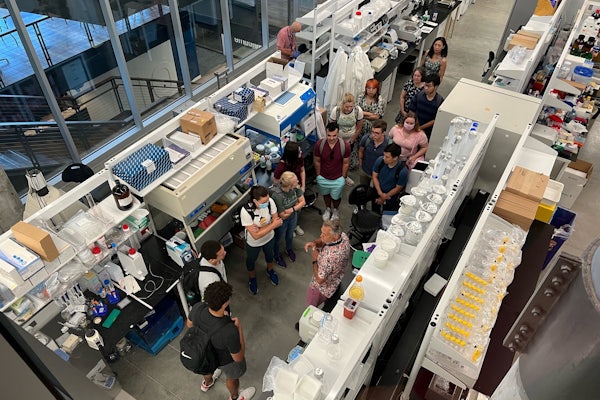Students gain engineering skills, grow connections in cardiovascular research experience
Program offers undergraduate students an opportunity to participate in cardiovascular research and gain hands-on experience

This summer, the Department of Biomedical Engineering at the McKelvey School of Engineering at Washington University in St. Louis held its first cardiovascular-focused undergraduate research experience, the Washington University Cardiovascular Research Summer Program (WashU CardS).
The 10-week program offered undergraduate students an opportunity to participate in cardiovascular research and to gain hands-on experience. Students also participated in a course on cardiac physiology and developing research skills, weekly Lunch & Learns and social activities.
Chao Zhou, associate professor of biomedical engineering, began this program with support from an Institutional Award for Undergraduate Student Training from the American Heart Association.
“We have a very strong cardiovascular research program,” Zhou said. “There are many researchers and faculty at WashU who are working on cutting-edge problems related to the heart, but we have a limited number of graduate students coming into the field. This program is a great opportunity to provide training for undergraduate students and get them excited about continuing their education in this area.”
The eight CardS students were matched with faculty mentors and gained experience in labs on both the Danforth Campus and at the School of Medicine. Students worked on projects that connected with their research interests.
Zach Tentor, a rising junior at the University of Virginia, worked in the lab of Matthew Bersi, assistant professor of mechanical engineering & materials science. Tentor has been studying the mechanical properties of mouse arteries and their response to pressurization and different forces. Looking at the cardiovascular impact of abnormalities in these arteries will help with understanding diseases like hypertension.
Tentor said his time in the CardS program has helped him to grow his technical engineering skills as well as his mindset.
“An important thing I’ve learned is that failure is okay. It’s expected, and it’s good,” Tentor said. “You need to fail to grow. I’ve grown to be less afraid of it, especially in my experiments if I make a couple mistakes one day and they didn’t turn out well.”
Baylor University rising junior Katie Barcak gained experience in the lab of Jon Silva, the Dennis & Barbara Kessler Career Development Associate Professor of biomedical engineering. During the program, Barack studied the dose response of mexiletine, an anti-arrhythmic drug, on different genetic variants found in arrhythmic patients to see the differential response.
The most valuable lesson Barcak learned this summer is the difference between lab research and undergraduate studies.
“Classes in undergrad are catered to learning more on a subject with questions that have answers already,” Barcak said. “In the lab, I learned more about the pace of research and how questions guide researchers to more questions and inspire further curiosity of the world around.”
“After this summer, I feel far more prepared in applying and pursuing graduate studies,” Barcak said. “I now know that I am capable as a researcher and that research is something I am truly passionate about.”
Caroline Carter, a recent graduate of the University of Texas at Arlington, worked in the lab of Adam Eggebrecht in the Department of Radiology at the School of Medicine. Her project focused on establishing feasibility for high-density diffuse optical tomography bedside neuromonitoring of infants with congenital heart disease who are undergoing extracorporeal membrane oxygenation known as ECMO, which redirects a patient’s blood and can involve stopping the heart.
Carter said she loves seeing the collaboration among different labs and that the experience solidified her goal to work on a medical campus.
“I love working with humans — the interaction is what I thrive on,” Carter said. “Now I know I want to work in this environment. I love it.”
However, when describing her favorite experiences from the program, spending time with the other CardS students was at the top of her list.
“We’re all from around the U.S., and we all bring something different to the table,” Carter said. “We have dinner, we go out – to the Arch, Cardinals games, grocery shopping – we hang out pretty much every single day. It’s really nice to come home and be able to talk about the different scientific projects we’re working on.”
Although the research portion of the experience is over, as part of the program, students will present their summer research projects at a national conference.



